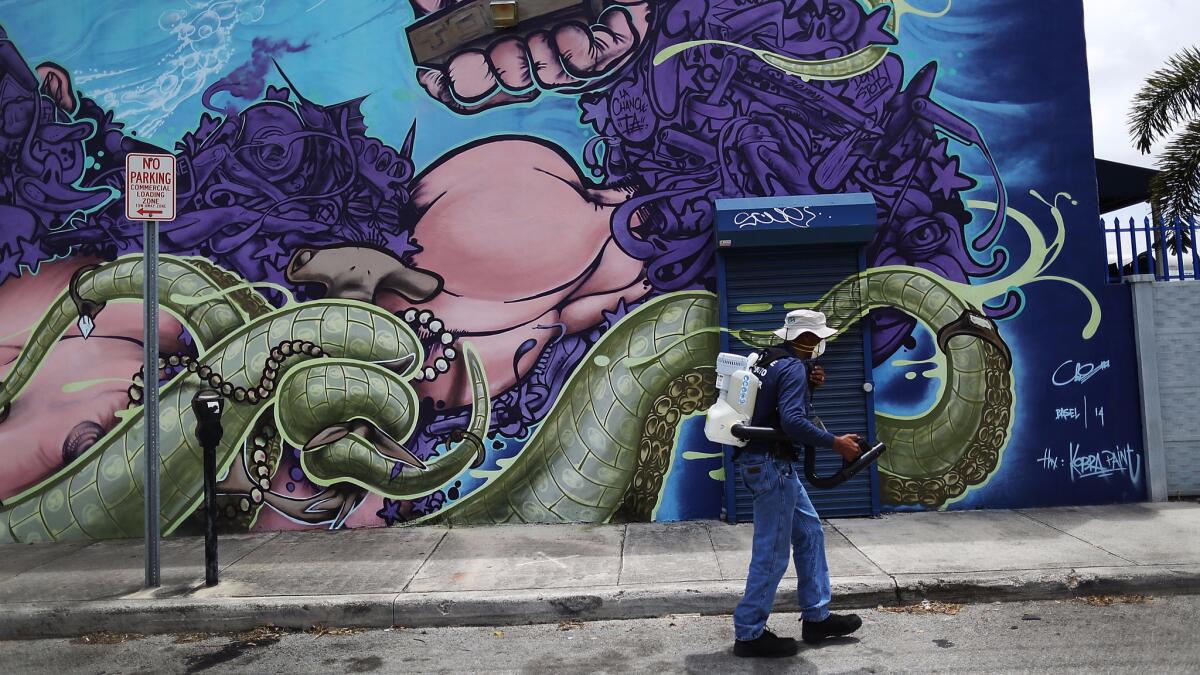From ‘shrines’ to head-to-toe attire: How Miami is coping with the arrival of Zika

- Share via
Reporting from Miami — Sherrie Varpula-Walter has spent most of the last week holed up in her apartment.
She is three months into her second pregnancy and doing everything she can to avoid being bitten by a mosquito infected with the Zika virus.
Her husband, Matt Walter, has taken charge of walking their two dogs. If she must run an errand, she sprays herself with insect repellent and puts on socks, jeans and a long-sleeved shirt — even though it’s 90 degrees outside.
In Miami, where health authorities have identified 16 cases of locally transmitted Zika, these are anxious times for expectant mothers and women hoping to become pregnant. The virus can inflict devastating damage to the brain of an infected woman’s fetus.
“You are in the worst possible situation now, and there is not much you can do about it,” said Varpula-Walter, a speech pathologist. “It’s just a waiting game.”
Obstetricians say they have been inundated with calls from patients wanting to be tested for the virus. Gov. Rick Scott has promised that the tests will be provided for free to pregnant women across the state, but demand has so far exceeded the limited supply.
News of the outbreak has also alarmed restaurateurs, gallery owners and others who live, work or hang out in Wynwood, a hip neighborhood just north of downtown where 13 of the infections occurred.
The U.S. Centers for Disease Control and Prevention issued a travel advisory last week urging pregnant women to avoid a 1-square-mile zone that includes the neighborhood, the first such warning in the continental United States.
Although activity in the area typically slows during the hot and humid summer, business and political leaders worry the outbreak could damage Florida’s all-important tourism industry. Visitors spent about $89 billion in the state last year.
JetBlue has announced that passengers who booked flights to Miami before Aug. 1 may qualify for a refund.
Some tour companies have stopped bringing visitors to Wynwood, famous for the bold murals covering old warehouse walls. Several outdoor events planned for this month, among them a brewery’s “Beer Circus,” have been canceled, and at least two businesses have temporarily closed their doors.
“When the CDC gives an advisory not to come to a neighborhood, it has real effects,” said Zak Stern, better known as Zak the Baker.
“Normally this place is packed. You can’t get a seat, ” he said, motioning to the mostly empty tables at his bakery and cafe in Wynwood. “It’s bad enough for me to have to make schedule changes … to make sure that we can get through it.”

At the same time, his wife is pregnant and he does not want to put their unborn child — or any family — at risk.
“I’m looking for the reasonable response,” he said, “and I don’t think I have enough clarity to make that judgment yet.”
Like many in the neighborhood, Stern has tried to inject an element of humor into the predicament.
On a wooden table outside the cafe, Stern set up a shrine to keep the virus at bay. There are sage sticks and healing crystals. Someone left half an orange, carefully wrapped in plastic.
“I don’t know what that would do,” Stern said. But he appreciates the gesture. “We need to stand united and fight this.”
Florida officials have responded aggressively, dispatching crews to find and test people who may have been exposed to the virus, fumigate around homes and businesses, and empty the standing water where mosquitoes breed.
Authorities had anticipated that Zika would begin spreading in Florida, which serves as a gateway for people traveling to and from Latin America and the Caribbean, regions where hundreds of thousands have been infected. More than 350 travel-related cases have been identified in Florida, 55 of them involving pregnant women.
Federal health officials do not anticipate that infections here will rival outbreaks that have occurred in countries such as Brazil, where millions of people live without air conditioning or screens on windows and doors to fend off mosquitoes.
The species that spreads Zika, Aedes aegypti, doesn’t travel more than 150 yards in its lifetime, and outbreaks of other diseases carried by the mosquito have been highly localized in the U.S.
But Dr. Thomas Frieden, director of the CDC, expressed concern last week that Florida’s stepped-up mosquito control measures did not appear to be working as well as hoped.
That may be partly because Aedes aegypti lays its eggs in small pools of water — as little as a teaspoon full — that can be hard to spot in a complex urban environment such as Wynwood.

Frieden also suggested that the species might be resistant to the two types of pyrethroid insecticides that have been sprayed using equipment carried in backpacks or mounted on trucks.
On Thursday, Miami-Dade County began aerial spraying of the insecticide naled, which Frieden said has proved effective at killing mosquitoes that other methods don’t reach.
“We are very encouraged by the initial results, which showed a large proportion of the mosquitoes killed,” he told reporters in Florida, where he had been observing the response.
The flights are controversial, however, with some residents saying they are more about the chemicals landing in their yards than the virus. Frieden said the tiny amounts being sprayed at dawn or dusk have no effect on people.
At the same news conference Thursday, Scott said state health officials had completed testing in a 10-block corner of Wynwood and found no evidence of active Zika transmission there.
Despite the cancellations and drop-off in business, not every enterprise there is suffering.
At the Wynwood Walls, an open-air museum showcasing street art, visitors still stream in to take selfies in front of the vibrant murals and sculptures.
Yenny Jimenez, who is 7½ months pregnant, brought her two visiting sisters-in-law, one of whom is also expecting. She wasn’t aware of the CDC advisory but didn’t seem overly concerned.
“Every time we go outside, we put repellent on,” said Jimenez, before wandering off to look at more art.
Down the street, a film crew was wrapping up a shoot. As the members gathered round for a group picture, the photographer called out cheerily, “Say Zika.” A nearby restaurant offered “pizzika” on the menu.
As night fell, some popular eateries filled with diners. It was a full house over at Gramps, a bar where owner Adam Gersten was fielding calls from patrons desperate to get into two sold-out comedy shows.
He was pleased to see county workers spray the venue’s courtyard with insecticide and leave pellets of larvicide where water collects amid the shrubbery. He also sets out bottles of repellent for the staff and patrons.
Gersten thinks most people in Miami are taking the outbreak in stride. “If it’s not Zika, it’s going to be a hurricane,” he said. “It’s just always some kind of tropical horror.”
That is little consolation to Varpula-Walter, who is expecting a daughter in January.
Although she does not live in the neighborhood, her husband helps manage an independent movie theater there, O Cinema. The virus can be spread sexually, so Walter too lathers up with insect repellent and covers himself in long clothing before heading to work.
She wishes others were so cautious -- especially when they travel to and from countries where the virus is spreading explosively.
“A big problem with Zika is trying to get people who are not pregnant, and don’t want to be, to care,” she said. “As I hole myself up in my apartment, I feel a certain amount of resentment that I can’t trust people on the street to be a little more careful.”
Twitter: @alexzavis
ALSO
When it comes to raising a child disabled by Zika, Brazilian women often do it alone
Two babies in California born with microcephaly from Zika, officials say
‘Zika is now here’: Mosquitoes are spreading virus in U.S.
More to Read
Sign up for Essential California
The most important California stories and recommendations in your inbox every morning.
You may occasionally receive promotional content from the Los Angeles Times.













